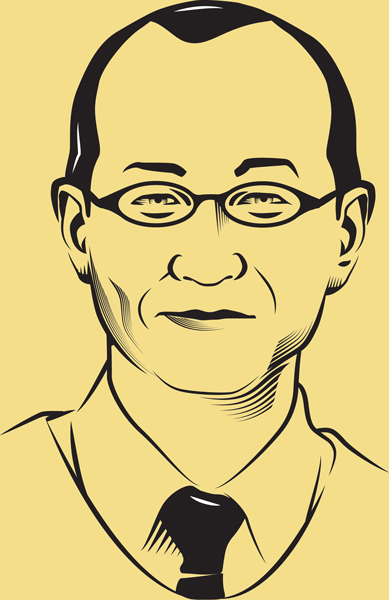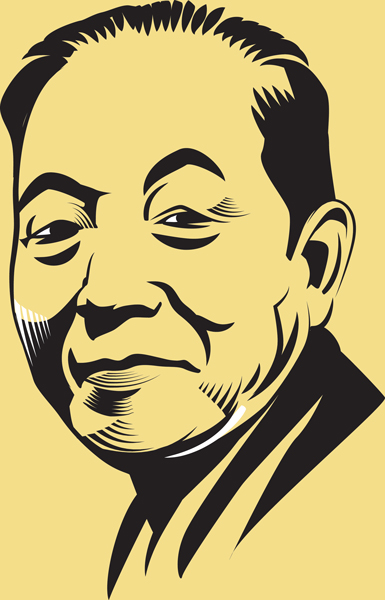Small talk doesn’t get much smaller than a conversation about the weather in a crowded elevator. Still, as the water drips down from our umbrellas, it’s hard to keep from saying: “This rain is crazy, huh?” It may be a cliché, but few things impact our lives more than our climate; when it acts strangely, we want to point it out and have others acknowledge it too. For the Japanese philosopher, social critic, and Buddhist historian Watsuji Tetsuro, our environment affects us in an even profounder way, as an essential component of the very structure of our experience.
Watsuji’s insight is the subject of a new book, Watsuji on Nature: Japanese Philosophy in the Wake of Heidegger, by Boston College philosophy professor David W. Johnson. The aim of the book is to explain what Johnson considers Watsuji’s most groundbreaking idea: fudo.
What exactly is fudo? Well, that question does not have a simple answer. The phenomena that fudo describes is so subtle and the analysis of it is so nuanced that even Watsuji seems to offer conflicting accounts. As Johnson sees it, Watsuji either didn’t fully comprehend or failed to fully articulate his own concept. He laments, “Time and again . . . Watsuji opens a door to a room that he never fully enters.” So Watsuji on Nature ends up being far more than just a summary of Watsuji’s work. Instead, it is a project of “speculative reconstruction” to “make explicit what remains unthought in Watsuji’s philosophy of nature . . . the full philosophical significance of the concept of fudo.”
Related: A New Way Forward
As Johnson explains, in ordinary Japanese fudo refers to the natural environment of a region, specifically with regard to its influence on the lives and cultures of its inhabitants. (Since the word’s closest English correlate, climate, fails to capture the social dimension of the word, his study leaves it untranslated.) Johnson lays out how Watsuji developed this novel concept primarily as an elaboration upon and critique of the phenomenology (study of experience) of the German philosopher Martin Heidegger, whose work Watsuji encountered while on a three-year scholarship in Europe beginning in 1927. (Two years earlier, he published Shamon Dogen, his groundbreaking investigation of Zen master Dogen’s Shobogenzo, which had been languishing in relative obscurity within Soto Zen monasteries before Watsuji rediscovered it as a subject for lay philosophers.) Soon after, he wrote the book Fudo about his new conception of nature, which he saw as a social and historical space that challenges our understanding of the self. Johnson argues that this view rescues nature from its lifeless depiction under the predominant scientific worldview, in part by demonstrating the philosophical value of examining our environment in the vibrant way that it appears when the sun cracks through a gray storm cloud. From this perspective, our moods, cultures, language, and the changing of the seasons are as vital to our understanding of the world as the various abstractions that have dominated European thought for centuries.

David Johnson is an assistant professor of philosophy at Boston College. His research focuses on the phenomenology of perception, the nature of expression, and the experience of truth. (Portrait Illustration by Yann Legendre)
A full view of fudo only begins to show itself in the last quarter of Johnson’s book. That’s because, unfortunately, understanding fudo first requires a basic grasp of its roots in phenomenology, which is hardly the most accessible school of philosophy. If Isaac Newton was standing on the shoulders of giants, Watsuji and Johnson are balancing on top of a wobbling human pyramid. Johnson does his best to point the way up, but Watsuji on Nature is written for readers who already have some familiarity with Heidegger. Still, for those with a passing (or in my case, fading) knowledge of the landscape, Johnson rearticulates the relevant points in a clear and concise manner, and with minimal jargon.
In brief, phenomenology is a philosophical method created by Heidegger’s teacher Edmund Husserl, who argued that Western philosophy’s preoccupation with the question of how to bridge the gap between a subjective consciousness and objective reality has been misguided. Instead, Husserl wanted to investigate our experiences as experiences, “bracketing” issues about material truth to focus on a holistic analysis of our ordinary perceptions. In shifting to this other question, Husserl uncovered a host of new and interesting observations about human existence that were not burdened by the subjective/objective debate.
Our experience is not primarily that of a separate consciousness trapped in its head.
Buddhists may hear an echo of the dharma in phenomenology’s focus on direct observations of experience. Heidegger took this nondualism a step further, asserting that the “objective” worldview is merely a helpful abstraction that we have allowed to obscure the “primordial” truth—the full and meaningful world in which we live our everyday lives. Heidegger used his own peculiar vocabulary to replace the subjective consciousness with Dasein, the being that questions its own being. Dasein literally means “being-there,” which is Heidegger’s way of pointing out that if we look at our
Watsuji on Nature: Japanese Philosophy in the Wake of Heidegger
by David W. Johnson, Northwestern University Press, August 2019, 256 pp., $34.95, paper
experience, we find ourselves in the “outside” world. Our experience is not primarily that of a separate consciousness trapped in its head; rather, when we look out at a sunset, we experience ourselves out-there, at the sunset. And the world that Dasein inhabits is already imbued with an inexhaustible array of meaning. In fact, it is only when something goes wrong, like when we trip on a broken sidewalk, that our problem-solving cognition starts breaking the world down into discrete parts. (We are always already thinking, however, and Heidegger does not suggest that we can or should return to a lost paradise of an automatic existence without thought.)

Tetsuro Watsuji (1889–1960) was a professor of ethics at Kyoto University and Tokyo Imperial University. His work notably combined theories of Eastern and Western philosophy. (Portrait illustration by Yann Legendre)
Watsuji saw how Dasein returned us to a meaningful and lived-in world, but, according to Johnson’s reading of Fudo, Heidegger’s formulation suffered from a Western bias toward individualism. Watsuji claims that Heidegger failed to sufficiently account for the primarily social nature of Dasein (or, for Watsuji, of sonzan ningen, “human being”) and that the German philosopher did not recognize the importance of the spaces that we inhabit.
For Watsuji and Johnson, fudo addresses this problem by expanding and making more social both the concept of world and the concept of human being—in much the same way that Heidegger reversed the priority of lived experience and scientific knowledge. Watsuji saw the human being as essentially aidagara, “being in relation to others.” Just as for Heidegger we are already outside ourselves in-the-world, for Watsuji we are always already socialized and fulfilling a social role.
This idea is not merely an observation about societies. Watsuji is offering a different understanding of self, one in which we step outside our individuated existence and experience a blending into a social whole—a phenomenon that can be seen when players in a game act as a single unit, or in the mood of a crowd, which belongs to no one and everyone. Watsuji also claims that our socialization is a fundamental structure of experience, and that we are only individuals in the sense that we can experience our relation to others as somehow lacking or broken.
Watsuji (as mediated by Johnson) goes on to show how aidagara is shaped by fudo and fudo by aidagara; both our climate and our culture are constitutive of our individual sense of self and of each other. In other words, before we even start to think about nature from a scientific perspective, we already find ourselves inhabiting an environment that is deeply meaningful to us as social space. And the full richness of our experiences can be understood only through this lens.
And yet we are not a hive mind, all functioning for the sake of one organism. As individuals, we can rebel or transgress, and although these actions make sense only within the social context, they are not reducible to the society in which they occur—they transcend it. So Watsuji argues that we are neither entirely distinct nor indistinct. Rather, he describes, in Buddhist fashion, both the social whole and the individual as “empty”—they exist only in relation to each other. Johnson notes that Watsuji, in a commentary on the 2nd-century Indian Buddhist philosopher Nagarjuna, wrote that emptiness does not mean monism, where everything is undifferentiated and made up of the same stuff called “emptiness.” Instead, Johnson says, “The logic of nondualism transcends this binary disjunction between one and many by denying and affirming both disjuncts. The very fact that something exists means . . . that it depends on other things and conditions for its existence.”

Watsuji kept his religious and philosophical writings separate, so in bringing them together Johnson does a great service. He makes explicit the Buddhist ideas that seem to be informing Watsuji’s treatment of Heidegger. And although it is not the stated goal of his study, Johnson ends up demonstrating that a fruitful exploration of Buddhist metaphysical concepts can take place within a Western philosophical framework. Here, we can see how the dharma and phenomenology can complement each other—the insights and long history of Buddhism offering ways to fill in some of the gaps in the much younger Western tradition, and phenomenology offering a new way of discussing experiences that Buddhism may simply declare “beyond words” or relegate to the realm of poetry.
Related: Focusing, an Interview with Eugene T. Gendlin
Johnson concludes that fudo should be understood as something that presents itself to us and through us. We inhabit and are shaped by our environment even as we allow it to be fully itself through our meaningful experience of it and occasional transcendence of it (such as when a religion or technology spreads beyond the region where it originated.)
“In this vision,” he writes, “we find the self and its consciousness are rooted in a source far greater and more profound than the awareness of a single individual: not only are we immersed in, and emerge from, the depths of the historical and social world, but our lives both shape and flow from the vast life of nature.”
While much of the significance of Johnson’s analysis is for people actively engaged in the world of phenomenology or modern Japanese philosophy, this reconstructed concept of fudo has a lot to offer Buddhist practitioners. Words and thinking may often be discounted as merely a map of the path to enlightenment—pointing the way, but not the way itself. Here, Johnson shows that they can provide still more: a light to show us the ground beneath our feet.